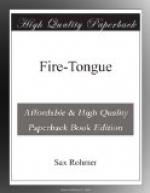Limping wearily, he worked his way along in the direction of Chancery Lane. But, before reaching Chancery Lane, he plunged into a maze of courts with which he was evidently well acquainted. His bookselling enterprise presently terminated, as it had commenced, at The Chancery Agency.
Once more safe in his dressing room, the pedler rapidly transformed himself into Paul Harley, and Paul Harley, laying his watch upon the table before him, lighted his pipe and indulged in half an hour’s close thinking.
His again electing to focus his attention upon Ormuz Khan was this time beyond reproach. It was the course which logic dictated. Until he had attempted the task earlier in the day, he could not have supposed it so difficult to trace the country address of a well-known figure like that of the Persian.
This address he had determined to learn, and, having learned it, was also determined to inspect the premises. But for such a stroke of good luck as that which had befallen him at the Savoy, he could scarcely have hoped. His course now lay clearly before him. And presently, laying his pipe aside, he took up a telephone which stood upon the dressing table and rang up a garage with which he had an account.
“Hello, is that you, Mason?” he said. “Have the racer to meet me at seven o’clock, half-way along Pall Mall.”
Never for a moment did he relax his vigilance. Observing every precaution when he left The Chancery Agency, he spent the intervening time at one of his clubs, from which, having made an early dinner, he set off for Pall Mall at ten minutes to seven. A rakish-looking gray car resembling a giant torpedo was approaching slowly from the direction of Buckingham Palace. The driver pulled up as Paul Harley stepped into the road, and following a brief conversation Harley set out westward, performing a detour before heading south for Lower Claybury, a little town with which he was only slightly acquainted. No evidence of espionage could he detect, but the note of danger spoke intimately to his inner consciousness; so that when, the metropolis left behind, he found himself in the hilly Surrey countryside, more than once he pulled up, sitting silent for a while and listening intently. He failed, always, to detect any sign of pursuit.
The night was tropically brilliant, hot, and still, but saving the distant murmur of the city, and ordinary comings and goings along the country roads, there was nothing to account for a growing anxiety of which he became conscious.
He was in gunshot of Old Claybury church tower, when the sight of a haystack immediately inside a meadow gate suggested a likely hiding place for the racer; and, having run the car under cover, Harley proceeded on foot to the little railway station. He approached a porter who leaned in the doorway. “Could you direct me to the house of his excellency Ormuz Khan?” he inquired.
“Yes, sir,” was the reply. “If you follow the uphill road on the other side of the station until you come to the Manor Park—you will see the gates—and then branch off to the right, taking the road facing the gates. Hillside—that’s the name of the house—is about a quarter of a mile along.”




